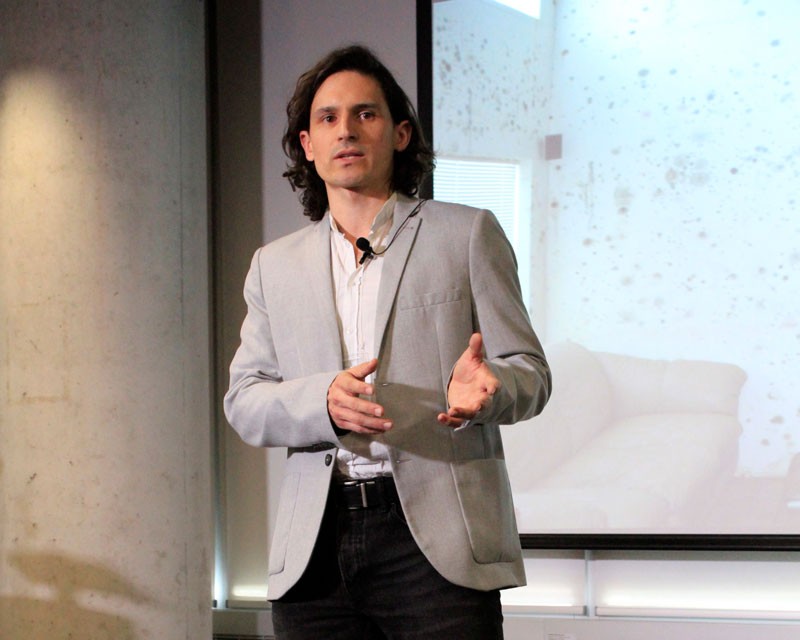Blog post
An Interview with Felipe Merino Gordo

We would like to introduce you to Felipe Merino Gordo, another one of our participants for the Three Minute Thesis & Project Competition. Felipe is a first-year Concordia graduate student completing a Master of Applied Science (MASc) within the department of Building, Civil & Environmental Engineering. He came to Montreal from Chile about a year ago with his partner and infant son. His initial decision to pursue a Masters at Concordia University was influenced by a professor who completed his PhD at Concordia and moved back to Chile to teach Building Science.
Before Felipe started his Masters, he worked for five years within the mining sector and although his academic background is in civil engineering, he states that his previous experience is not related to what he’s doing now. “The only relationship is the construction component,” he says.
Discussing Felipe's Research and Involvement in 3MT
What was the driving force for wanting your research to be about studying mold?
Felipe: I wasn’t thinking about mold when I came here, I was thinking more about Net Zero Energy buildings. My supervisor suggested that I look at the problem of what happens with mold when we increase the thickness or increase the level of insulation. I found it interesting because in Chile that problem is not very common. There aren’t many people who do studies related to that or solve that kind of problem. It was not what I expected to study, but I think it’s an interesting subject. In Canada and other Northern countries it is a very big problem, and cases have increased since we started building more energy efficient buildings. This research will help to build energy efficient homes without the risk of mold. The thesis is also related to energy consumption, so I’m still doing part of what I initially thought.
What made you want to participate in the Three Minute Thesis & Project Competition?
Felipe: My supervisor sent us an email telling us to look at the event. I thought that it was interesting, but the main reason I wanted to participate was that I wanted to improve my presentation skills. I thought it was the best chance that I had to really force myself to improve, getting out of my comfort zone and being exposed to something that I honestly don’t like. I’m very shy so I don’t like to speak in public, but you need to do it. It’s healthier to be relaxed when you have to do it.
How did you feel standing up in front of an audience and presenting your work?
Felipe: Three minutes is so short. It’s like you breathe one time and you say your speech [and it’s over]. We practiced many times, so I had it kind of memorized. Three minutes is very fast, but it was a very good experience. After you finish, it’s very comforting to know that you did it much better than in the rehearsals.
Did 3MT help you discover anything new about your research?
Felipe: I’m not sure if it helped me discover something new, but it really helps you to better understand what you are doing and why you are doing it. Sometimes you’re so immersed in your research that you can lose the objective of what you’re doing, so condensing the work into three minutes and a couple of key ideas really helps to understand what you’re doing.
Felipe's Personal Experiences in Montreal and Balancing Academia with Familial Responsibilities
How do you find Montreal compared to Chile?
Felipe: There are some things that are very different from Chile and some things that are very similar. I think after one year, I still don't know the city very well. The first year was just trying to adapt to studying again after five years of being out of univeristy and with a small child.
How would you describe your experience completing a Masters while caring for your son whose still at a very young age?
Felipe: With a son, it’s totally different. I compare myself with other students that are here, who are single, and they have one hundred percent of their time for studying or doing whatever they want. I just have to try to be more efficient with my work, trying to be at home when my son is awake and working more at night. You just have to adjust.
Have you connected with the Chilean community in Montreal?
Felipe: By chance I have because I’m also participating in the Solar Decathlon, which is a competition that will take place in China next year. We have to build an energy efficient house in twenty days. Last summer we built a house at Loyola campus and we dissembled it and shipped the house to China. In July we’ll start the construction and participate in ten competitions. One of them, for example, includes hosting two dinner parties for up to eight guests. The house uses only electricity from the grid and solar energy.
The architecture is from McGill and Concordia is doing the energy simulation and the mechanical systems. At McGill there is also a Chilean who is participating. I met him and he introduced me to other people. I met friends of his and we play soccer together. It’s easy to connect with people here, I think there are a lot of people within the same situation.

